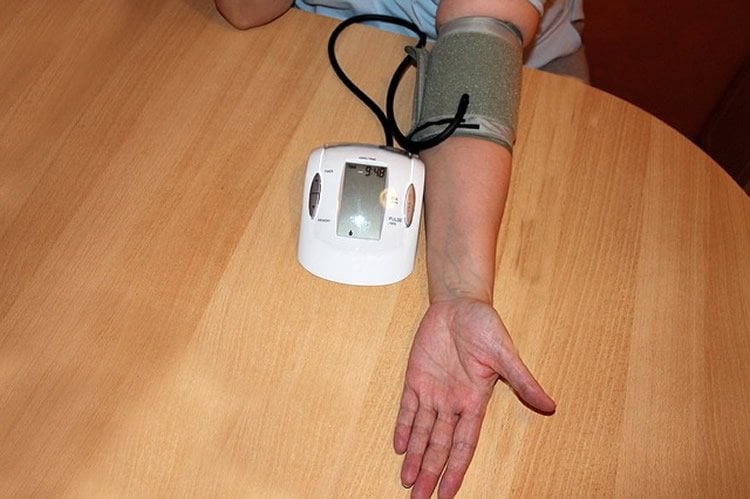Summary: A new study links higher resting blood pressure in younger men with later onset of OCD, schizophrenia and substance abuse problems.
Source: University of Helsinki.
The connections between resting heart rate, blood pressure and psychiatric disorders were studied using register data from more than one million Swedish men. The study was published in the journal JAMA Psychiatry.
Many mental health disorders have been found to be associated with abnormalities in heart function and blood pressure. Heart rate and blood pressure are regulated by the autonomic nervous system which controls the body’s basic functions. There has previously been no comprehensive research on whether discrepancies in the function of the autonomic nervous system could precede the onset of psychiatric illnesses.
The research used heart rate and blood pressure measurements from conscripts for the Swedish army, linked with information from national patient registers. The results indicate that men whose resting heart rate was higher than 82 beats per minute during their youth were 69% more likely to later be diagnosed with obsessive-compulsive disorder than men whose resting heart rate was lower than 62 bpm. The risk for schizophrenia increased by 21% and for anxiety disorders, 18%.
The study considered several factors that could contribute to the connection, such as BMI, socioeconomic status, ethnic background, cognitive ability as well as physical fitness measured through an exercise test. However, these factors did not fully account for the correlation between psychiatric disorders and heart rate or blood pressure. The average follow-up period was 32 years.

The study also shows that low resting heart rate was linked to an increased risk of substance abuse and convictions for violent crimes.
“These results are interesting, because they provide new information on the role of the autonomic nervous system in psychiatric disorders,” explains University of Helsinki postdoctoral researcher Antti Latvala, who led the project.
Latvala points out that the mechanisms underlying this connection still require a great deal of further study.
“Our observations indicate that differences in physiological responses, such as stress reactions, are linked to the risk of mental disorders. It is also known that psychiatric illnesses are associated with an increased risk for cardiovascular disease. Our results open new opportunities for studying this connection as well,” Latvala says.
Source: Dr. Antti Latvala – University of Helsinki
Image Source: NeuroscienceNews.com image is in the public domain.
Original Research: Full open access research for “Association of Resting Heart Rate and Blood Pressure in Late Adolescence With Subsequent Mental Disorders: A Longitudinal Population Study of More Than 1 Million Men in Sweden” by Antti Latvala, PhD; Ralf Kuja-Halkola, PhD; Christian Rück, MD, PhD; Brian M. D’Onofrio, PhD; Tomas Jernberg, MD, PhD; Catarina Almqvist, MD, PhD; David Mataix-Cols, PhD; Henrik Larsson, PhD; and Paul Lichtenstein, PhD in JAMA Psychiatry. Published online October 26 2016 doi:10.1001/jamapsychiatry.2016.2717
[cbtabs][cbtab title=”MLA”]University of Helsinki “Higher Resting Heart Rate and Blood pressure Linked to Later Psychiatric Illness.” NeuroscienceNews. NeuroscienceNews, 26 October 2016.
<https://neurosciencenews.com/psychology-blood-pressure-mental-health-5361/>.[/cbtab][cbtab title=”APA”]University of Helsinki (2016, October 26). Higher Resting Heart Rate and Blood pressure Linked to Later Psychiatric Illness. NeuroscienceNew. Retrieved October 26, 2016 from https://neurosciencenews.com/psychology-blood-pressure-mental-health-5361/[/cbtab][cbtab title=”Chicago”]University of Helsinki “Higher Resting Heart Rate and Blood pressure Linked to Later Psychiatric Illness.” https://neurosciencenews.com/psychology-blood-pressure-mental-health-5361/ (accessed October 26, 2016).[/cbtab][/cbtabs]
Abstract
Association of Resting Heart Rate and Blood Pressure in Late Adolescence With Subsequent Mental Disorders
A Longitudinal Population Study of More Than 1 Million Men in Sweden
Importance Differences in cardiovascular autonomic activity between individuals with psychiatric disorders and healthy controls have been observed, but whether cardiovascular autonomic abnormalities are associated with subsequent psychiatric disorders is unknown.
Objective To investigate whether differences in cardiac autonomic function as indexed by resting heart rate and blood pressure are associated with psychiatric disorders during the lifetime of men in Sweden.
Design, Setting, and Participants We conducted a longitudinal register-based study of Swedish men whose resting heart rate (n = 1 039 443) and blood pressure (n = 1 555 979) were measured at military conscription at a mean (SD) age of 18.3 (0.6) years during the period from 1969 to 2010, with register-based follow-up data available until the end of 2013. Analyses were performed from November 18, 2015, to June 9, 2016.
Main Outcomes and Measures Dates of inpatient/outpatient diagnoses of anxiety disorders, obsessive-compulsive disorder, posttraumatic stress disorder, depressive disorders, bipolar disorder, schizophrenia, and substance use disorders and convictions for violent crimes, between 1973 and 2013, were obtained from nationwide registers. Adjustments were made for height, weight, body mass index, cardiorespiratory fitness, cognitive ability, and socioeconomic covariates.
Results After adjustment for covariates, Cox regression models with up to 45 years of follow-up data showed that men (mean [SD] age of 18.3 [0.6] years at conscription) with resting heart rates above 82 beats per minute had a 69% (95% CI, 46%-94%) increased risk for obsessive-compulsive disorder, a 21% (95% CI, 11%-33%) increased risk for schizophrenia, and an 18% (95% CI, 13%-22%) increased risk for anxiety disorders compared with men with resting heart rates below 62 beats per minute. Similar associations were observed with systolic/diastolic blood pressure. In contrast, lower resting heart rate and lower systolic blood pressure were associated with substance use disorders and violent criminality.
Conclusions and Relevance Our results suggest that for men, differences in heart rate and blood pressure in late adolescence are associated with lifetime major psychiatric disorders, with higher levels associated with obsessive-compulsive disorder, schizophrenia, and anxiety disorders and lower levels associated with substance use disorders and violent behavior. Differences in autonomic nervous system functioning may predate or represent an early marker of psychiatric disorders.
“Association of Resting Heart Rate and Blood Pressure in Late Adolescence With Subsequent Mental Disorders: A Longitudinal Population Study of More Than 1 Million Men in Sweden” by Antti Latvala, PhD; Ralf Kuja-Halkola, PhD; Christian Rück, MD, PhD; Brian M. D’Onofrio, PhD; Tomas Jernberg, MD, PhD; Catarina Almqvist, MD, PhD; David Mataix-Cols, PhD; Henrik Larsson, PhD; and Paul Lichtenstein, PhD in JAMA Psychiatry. Published online October 26 2016 doi:10.1001/jamapsychiatry.2016.2717






